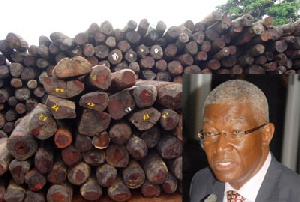The Ministry of Lands and Natural Resources on Thursday issued a directive on the moratorium on the sale of seized chainsaw lumber which came into effect since October 21 this year.
Nii Osah Mills, the sector Minister, recounted that since he took over as the sector Minister in July 2014, his attention was constantly being drawn to chainsaw materials on our roads and several collection points to the extent that the first point of purchase of timber for projects by many Ghanaians was chainsaw rather than recognized sawmills.
He said the reasons for this were many, but the most common reason was that the chainsaw material was cheap and readily available.
“In order to ascertain the extent of the problem, the first action was to institute a moratorium on the sale of chainsaw lumber, and at the same time intensify our monitoring and patrol activities,” Nii Mills stated at a press briefing at the Forestry Commission Depot at the Achimota Forest in Accra.
He explained that the action was also to enable them to review and streamline the processes of the confiscation and sale of seized wood.
Nii Mills said: “My observation over the last six weeks based on the number of vehicles seized with chainsaw in Accra alone indicate that the situation is very alarming and if not controlled, our efforts to fight against deforestation and forest degradation will be meaningless.”
“The worrying observation is that, even contractors who have won contracts to undertake government projects patronize illegal chainsaw material for such projects.”
He observed that even though chainsaw lumber was cheaper than sawmill lumber, the quality of the wood was largely inferior in the sense that the chainsaw operators often fell immature trees which were not good for construction.
In addition, he said chainsaw operations were wasteful, and depleted the environment and at the same time deprived the nation of substantial taxes which they did not pay at all.
Nii Mills said as part of efforts to address the chainsaw menace and reduce the large volume of illegal wood traded in the domestic market; which currently stands at 80 per cent, government would soon approve the implementation of a Timber Procurement Policy, to mandate all government projects to be undertaken with only legally produced lumber.
He said in addition, the Rapid Respond Team of the Forestry Commission, would be strengthened to intensify monitoring activities at the forest gate, in transit from the forest and the market centres, to clamp down on all illegal activities.
Nii Mills directed the Forestry Commission to, henceforth, dispose of all seized lumber over the past six weeks, based on their existing guidelines and procedures.
“This should, however, be done with transparency, fairness and accountability,” he added.
He said the Forestry Commission should also note that this directive does not include seized rosewood, declaring that the ban on the harvesting, transporting and export of Rosewood still remains in force.
“The general public is advised, henceforth, to desist from acts of engaging chainsaw operators to produce lumber for them from the regions, districts and forest endowed areas to ensure that we can collectively discourage chainsaw operations as a matter of national concern,” he stated.
The Minister urged the media to carry out extensive education and awareness creation on the chainsaw menace, so that we could guarantee our future generations richer and healthier forest and wildlife resources than we inherited.
Business News of Saturday, 6 December 2014
Source: GNA

















